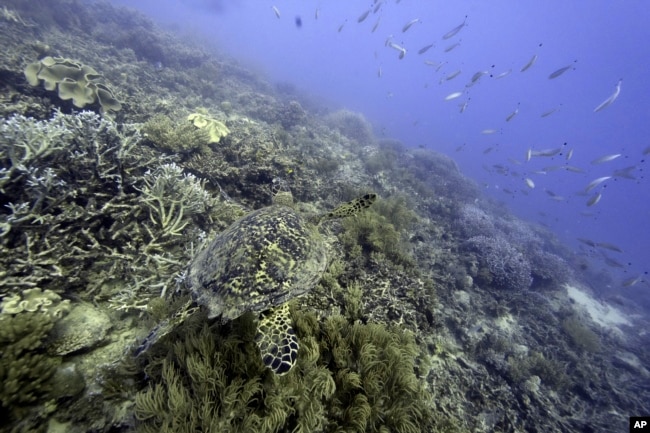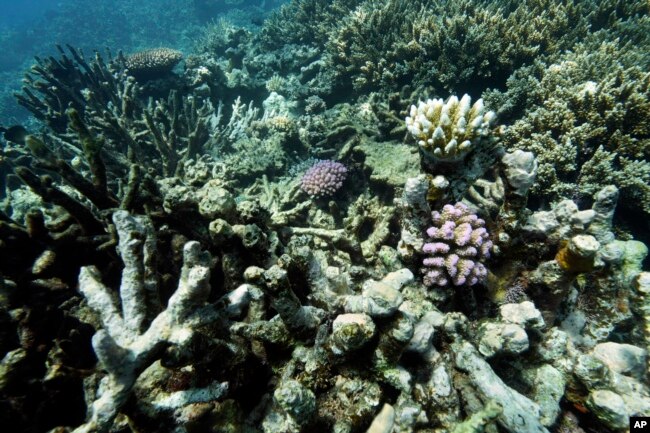UN Group to Soon Begin Accepting Deep Sea Mining Permit Application

The International Seabed Authority (ISA) is the United Nations body that makes rules about the world’s ocean floor. It is preparing to continue negotiations that could open the international seabed for mining, including for materials central to the move to green energy.
The organization will soon need to begin accepting mining permit applications after years of negotiations.
But environmental activists and some scientists are expressing concerns over the possible effects on animal life and the deep-sea environment.

FILE - A sea turtle swims over corals on Moore Reef in Gunggandji Sea Country off the coast of Queensland in eastern Australia on Nov. 13, 2022. (AP Photo/Sam McNeil, File)
What is deep sea mining?
Deep sea mining involves removing minerals and metals from the ocean’s seabed. There are three kinds of deep sea mining.
The first involves taking materials known as polymetallic nodules off the ocean floor. The second involves mining seafloor sulphide deposits. And the third involves taking cobalt crusts from rock.
These mined materials contain nickel, rare earth, cobalt and more. Such materials are needed for batteries and are used in developing renewable energy. The materials are also for everyday technology like phones and computers.
Companies and governments view these resources as very important as current reserves decline and demand continues to rise.
What are the current rules for deep sea mining?
Countries control their ocean territory and special economic areas. But the high seas and the international ocean floor are governed by the United Nations Convention on the Law of the Seas. It is considered to be a rule for all states, whether or not they have signed or officially approved it.
Under the treaty, the seabed and its mineral resources are considered the “common heritage of mankind.” The resources must be managed in a way that protects the interests of humanity. The idea is to share economic benefits, support scientific research, and protect ocean environments.
Companies interested in deep sea mining are partnering with countries to help them get exploration licenses.
More than 30 exploration licenses have been issued so far. Most of these have activity in an area called the Clarion-Clipperton Fracture Zone, which crosses 4.5 million square kilometers between Hawaii and Mexico.
Why must ISA establish rules now?
The U.N. Convention on the Law of the Seas says that the ISA is supposed to complete rules governing deep sea mining by July 2023.
Countries and private companies can start applying for early, or provisional licenses if the U.N. body fails to approve a set of rules by July 9.
What are the concerns?
Yet environmental activists and scientists are concerned about deep sea mining.
Only a small part of the deep seabed has been explored and some worry that the environment will be damaged by mining.
Engineering and technology used for deep sea mining are still developing.
Some companies are looking to get materials from the seafloor using large pumps. Others are developing artificial intelligence-based technology that would teach deep sea robots how to get materials from the floor. Some are looking to use special machines that could mine materials off the sides of underwater mountains and volcanoes.
Damage from mining can include noise and light pollution, as well as possible leaks and spills of fuels and other chemicals used in the mining process.
The full effects on the deep-sea environment remain unclear. But scientists have warned that biodiversity loss is sure to happen and could be irreversible.
Christopher Kelley is a biologist with research expertise in deep sea ecology.
“We’re constantly finding new stuff and it’s a little bit” early “to start mining the deep sea when we don’t really understand the biology, the environments... or anything else,” he said.

FILE - Coral on Moore Reef is visible in Gunggandji Sea Country off coast of Queensland in eastern Australia on Nov. 13, 2022. (AP Photo/Sam McNeil, File)
What comes next?
The ISA’s Legal and Technical Commission, which oversees the development of deep sea mining regulations, will meet in early July to discuss the mining rules.
The earliest that mining under ISA rules could begin is in late 2024 or 2025. Applications for mining must be considered and environmental studies need to be carried out.
For now, some companies — such as Google, Samsung, BMW and others — have backed the World Wildlife Fund’s call to promise to avoid using minerals that have been mined from the planet’s oceans.
More than ten countries—including France, Germany and several Pacific Island nations— have officially called for a ban or pause on deep sea mining, at least until environmental protections are in place.
Other countries, such as Norway, are proposing opening their waters to mining.
Words in This Story
seabed – n. the ground that is at the bottom of the sea
permit – n. an official document that shows that a person is allowed to do or have something
application – n. a formal and usually written request for something
battery – n. a device that is placed inside a machine to supply it with electricity
heritage – n. the traditions or achievements that are part of the history of a group
license – n. an official document that gives you permission to do, use, or have something
irreversible – n. impossible to change back to a previous state
https://learningenglish.voanews.com/a/un-group-to-soon-begin-accepting-deep-sea-mining-permit-application/7170034.html